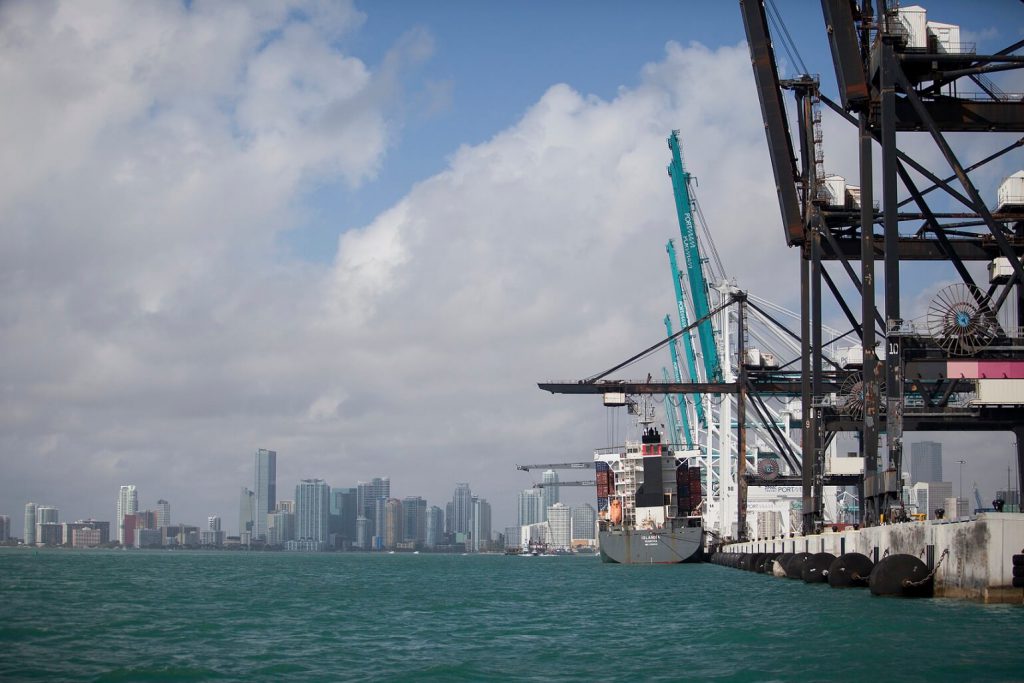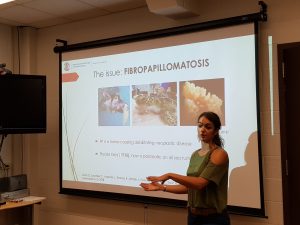Costanza Manes, One Health Center Zoologist and Leonardo Fellow
A New, Puzzling Project
I am working on a project on a very ugly disease affecting sea turtles. I’m a zoologist, a scuba diver, and always liked marine life with a great interest in infectious diseases. I was looking for a wildlife health issue in Florida to study in more depth and help solve. Reading around, I found out about a cancer disease affecting marine turtles globally. Researching this tumor seemed like an amazing and super-exciting opportunity.

To give you a bit of background; this disease, called Fibropapillomatosis (yes, super long and complicated name), has been recorded in great numbers only in the last few decades. Since the virus responsible for this disease has been in the turtle for thousands of millions of years, it must have been something in the environment triggering this disease to burst. Thus, I started reading, meeting people, and meeting actual sick sea turtles. I was off to a great start, my knowledge increased, and my research started to take up a shape and sense.
Given these premises, I had to find an environmental trigger that could possibly cause the disease outbreak observed in the past decades. What has changed? Well, our impact. Humans have been polluting and warming up the ocean at unprecedented rates.
Reaching Out
I therefore decided to try and focus on temperature and sea current changes and see if these could be partially responsible or linked to this disease. Easy. All I needed to do was gather A LOT of sea turtle disease recording, check out what the temperature and sea current measures had been, and compare these data.
Did I say easy? I’ll take it back.

After having collected my nice data set with all the sick little turtles’ data, I embarked on my pursuit for temperature data. Go on Google, type “temperature of day mm/dd/yyyy”, hit search, and basically get a slap in the face. Going crazy on my computer, all that I could find were maps and files with formats I had never seen before, and more maps, and more colors and more files and more confusion.
Therefore, without a clue on how to move past that, I did what in science I consider one of the best and smartest things to do: ask for help.
It crossed my mind that my center, the One Health Center of Excellence, had just awarded a fellowship to a Coastal and Oceanographic Engineering department PhD student, Daniele Pinton. I wondered: “Would he know the sea temperature off the Hawaiian coast on October 11th, 2007, when 148 sick sea turtles were recorded?” Or, less specifically: “Would he have access and availability to satellite-recorded temperatures and currents of seawater overtime?” Yes, he did.

Now, Wish Us Luck!
This is how the journey of a collaboration between two Leonardo Fellows at the One Health Center of Excellence started. Since then, Daniele and I, together with my Director Professor Ilaria Capua and his supervisor Professor Alberto Canestrelli, have had meetings and exchange of ideas on how to best move forward with the design of this project. Our preliminary study design and data collection was successfully presented last week to the Archie Carr Center for Sea Turtle Research.
This story, well only the start of a story, is a beautiful example of how two young scientists from completely different backgrounds came together to work on a project that investigates a serious wildlife health issue. Two fellows affiliated with the One Health Center, a zoologist and an engineer, will work on unraveling the pattern of development dynamics of a disease burden originated from anthropogenic change. Even though the future is unknown and the path will be hard, it is for me and for the One Health Center already an achievement to have established this partnership between two fellows. Walking from different perspectives, we aim to reach the same goal of conducting research for the improvement of ours, animals’ and ecosystems’ health.
 0
0
